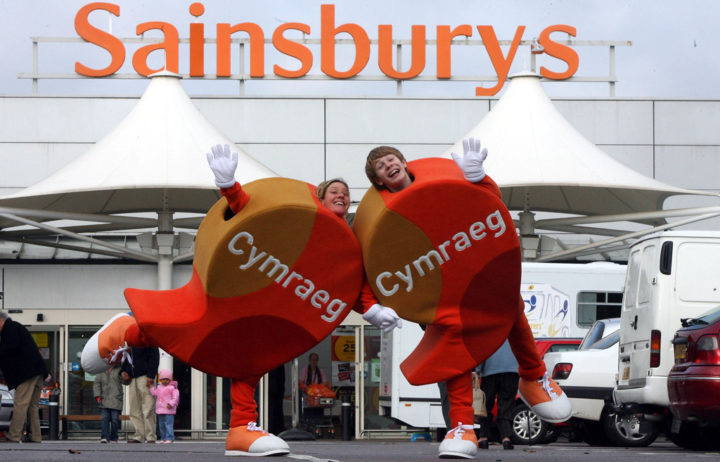Promoting Welsh language through volunteering
Overview
- Introduction
- Marketing your volunteering opportunities
- Welsh in delivery of services and day-to-day operations
- Creating opportunities for Welsh speakers and learners
- Further Information
Introduction
Legislation
Wales is a bilingual country and has a strong ambition to increase the use of the Welsh language. In Wales the Welsh Language has official status which means it should be treated no less favourable than the English Language. The Welsh Language (Wales) Measure 2011 is the legislation that created the Welsh language standards. They apply to all public bodies including Welsh Government, local authorities and National Parks. The standards serve as a model of good practice for all organisations in Wales.
The Welsh Language Commissioner
The post of Welsh Language Commissioner was created by the Welsh Language (Wales) Measure 2011. The Measure gives the Commissioner specific regulatory functions and powers, including setting and enforcing Welsh language standards and determining on complaints and investigations. The Commissioner now supports voluntary sector organisations in producing their Welsh Language Promotion Plans.
The Welsh Offer is recognition by the Commissioner given to organisations with a strong plan. It is an opportunity to transform your engagement with the public by showing how proud you are to offer services in Welsh.
Why consider the Welsh language?
“The Welsh language is one of the treasures of Wales. It is part of what defines us as people and as a nation. Our ambition as Welsh Government is to see the number of people able to enjoy speaking and using Welsh reach a million by 2050. This is certainly a challenging ambition, but a challenge we believe is worthwhile and necessary if we are to secure the vitality of the language for future generations” (Cymraeg 2050 – A million Welsh speakers)
The voluntary sector has a prominent role to play in this ambition especially as we discuss increasing the use of Welsh in the workplace, in services and of course, the social use of the Welsh language. With nearly 44,000 voluntary organisations working in Wales and 124,800 working in the voluntary sector, there is no doubt that it has a significant influence.
Marketing your volunteering opportunities
Promotional materials
As with online adverts and bilingual websites, providing physical marketing materials such as posters and leaflets in both Welsh and English is highly encouraged. Support is available from the Welsh Language Commissioner and services such as ‘Helo Blod’, a free, fast and friendly Welsh translation and advice service that will help you use more Welsh in your organisation. Using just a little Cymraeg can make a big difference.
The benefits of bilingual marketing by voluntary sector organisations, more generally, has been researched by the Welsh Language Commissioner and found to be beneficial. It helps to establish the Welsh ethos of an organisation, which is valued by Welsh speakers and non-Welsh speakers alike.
70% of survey participants thought that charities operating in Wales should market bilingually. Such bilingual communication adds credibility and indicates a commitment to Welsh society and Welsh culture. This is especially significant in relation to voluntary sector organisations whose Head Office is outside of Wales.
Welsh in delivery of services and day-to-day operations
As organisations seek to improve the ways in which they deliver services in Welsh and English languages, there will be growing potential for volunteers to use their Welsh language skills to assist with this.
For example, guidance is available, based on research, on how to conduct sports coaching bilingually. The techniques developed in this field are transferable to other areas where bilingual communications with groups would be appropriate.
As use of social media continues to grow, there is a role for posting comments in Welsh and English and volunteers may be able to assist with this.
Specific needs for Welsh language skills should be made clear when advertising volunteer roles, including the type of skill (listening and speaking, reading, writing) and degree of proficiency.
Remember: Existing volunteers may also have valuable language skills which could be put to better use for the benefit of your organisation and its beneficiaries.
Creating opportunities for Welsh speakers and learners
Volunteering is recognised as a two-way process which benefits both the volunteering involving organisation and the volunteers themselves. Good volunteer programmes will be looking for ways in which volunteers can grow and develop, whether for personal interest and enjoyment, to gain life skills or to improve employability.
The aim in introducing the Welsh Language measures is that those who wish can live out their everyday lives through the medium of Welsh in Wales.
Through volunteering, organisations can offer an environment where people can socialise through the medium of Welsh or can practice their language skills to improve confidence and proficiency in an informal setting. They can provide a means for young people leaving the Welsh language education system to continue to use their Welsh and, for those still in education, a way of using the language beyond the classroom.
Further information

‘Welsh Language Volunteering Framework: A guide for third sector organisations’
Funded by Volunteering Wales Strategic Grants, this framework is part of a wider initiative by Mentrau Iaith Cymru to create a situation where voluntary organisations have a full understanding of how to actively attract volunteers who wish to use the Welsh language, and there is an increase in the number of people who volunteer and do so through the medium of Welsh.



